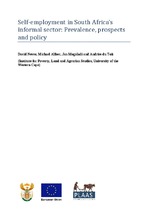Self-employment in South Africa’s informal sector: Prevalence, prospects and policy
Date
2011Author
Neves, David
Aliber, Michael
Mogaladi, Jan
du Toit, Andries
Metadata
Show full item recordAbstract
This text describes research undertaken to investigate small-scale self-employment at the
margins of the South African economy. Despite high levels of poverty and unemployment
South Africa’s informal sector is, by developing country standards, comparatively small. As
economic informality is crucial to the livelihoods of many impoverished households, this is
not only an issue of theoretical interest but of public policy significance. The research
described in what follows drew on an integrated qualitative and quantitative inquiry in order
to understand the contribution of informal self-employment to the livelihoods of
impoverished households. The study sought to examine the factors that both enable and
constrain informal self-employment, as well as state policies and programmes concerned with
economic informality. The chapter concludes by discussing a number of policy
recommendations intended to enhance the ability of policymakers to appropriately support
the livelihoods of the poor.
Since being coined almost four decades ago, the nomenclature of the ‘informal sector’ has
been used to describe marginal and low-productivity economic activities, often outside the
realm of state regulation and taxation (Hart, 1972). More recently enterprise-based definitions
of economic informality have been eclipsed by employment-based conceptions, and refer to
those who labour outside networks of employment contracts, protections and benefits (Jutting
et al. 2007). However, in much the same way as the controversial concept of a ‘second
economy’ (African National Congress, 2004), the moniker of the informal sector potentially
invokes an overstated dualism. It overlooks the manner in which formal and informal are
intertwined, and the manner in which the precarious employment conditions associated with
informality are increasingly to be found at the heart of ‘formal’ enterprises and economies.
These are increasingly manifest in practices such as outsourcing, casualisation and
contractualisation. Although the concept of the informal sector enjoys much continued usage
it is a contested and imprecise concept that potentially obscures as much as it reveals.

